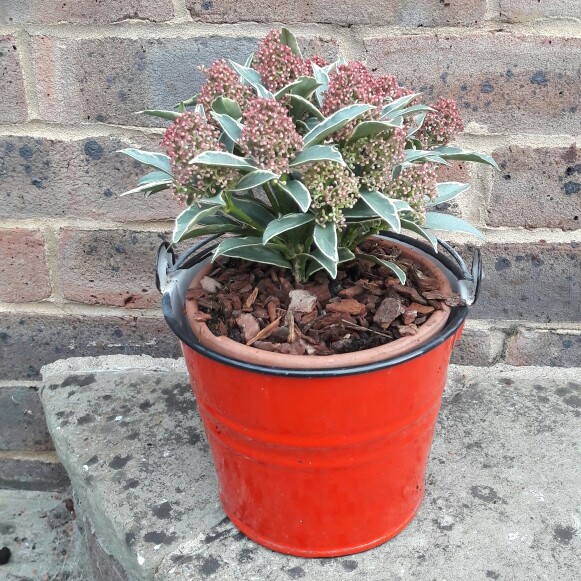
Skimmia japonica 'Mystic Marlot'
Japanese Skimmia 'Mystic Marlot'
Skimmia japonica, commonly known as the Japanese Skimmia, is an evergreen flowering shrub that is native to parts of South East Asia. It has leathery green leaves, and produces clusters of fragrant flowers which are either white or cream in colour. Plants are either male or female (designated by their cultivar type) and female plants produce clusters of berries if the flowers have been pollinated. Berries can be either shades of red, pink or white. 'Mystic Marlot' is a compact skimmia and a male plant so does not produce berries. It has white flower buds that change to pink and open to fragrant white flowers.
Contributed by @Tulip
-
Partial shade
-
Occasional watering
-
Full Frost Hardy: 5F (-15°C)
-
Moist and free draining
Common name
Japanese Skimmia 'Mystic Marlot'
Latin name
Skimmia japonica 'Mystic Marlot'
type
Evergreen Flowering Shrub
family
Rutaceae
ph
5.0 - 6.5 Acid - Neutral
Plant & bloom calendar
-
Best time to plant
full grown dimensions
 0.80 M
0.90 M
0.80 M
0.90 M
Skimmia japonica 'Mystic Marlot'
Skimmia japonica, commonly known as the Japanese Skimmia, is an evergreen flowering shrub that is native to parts of South East Asia. It has leathery green leaves, and produces clusters of fragrant flowers which are either white or cream in colour. Plants are either male or female (designated by their cultivar type) and female plants produce clusters of berries if the flowers have been pollinated. Berries can be either shades of red, pink or white. 'Mystic Marlot' is a compact skimmia and a male plant so does not produce berries. It has white flower buds that change to pink and open to fragrant white flowers.
Planting Outdoors in Spring
From Early Spring TO Mid Spring
Place pot grown plants into growing position having dug in plenty of rotten manure or garden compost, water well in. They prefer locations in part shade, with little direct sun. In areas of extreme shade, they will become long and leggy. They prefer a moist, but well drained acidic soil that is rich in organic matter. Alkaline or sandy soils can also be troublesome.
Propagating by cuttings
From Mid Summer TO Early Autumn
Semi hard wood cuttings are taken from the current years growth from late summer to mid autumn the bottom of the cuttings is hard and soft on the top. With a sharp knife take a cutting of about 14cms, remove lowest leaves, dip end into rooting hormone, and place round the edge of a pot filled with a suitable compost, water well, they must remain moist till rooted, place under glass but in semi shade.
Planting Outdoors in Autumn
From Mid Autumn TO Late Autumn
Place pot grown plants into growing position having dug in plenty of rotten manure or garden compost, water well in. They prefer locations in part shade, with little direct sun. In areas of extreme shade, they will become long and leggy. They prefer a moist, but well drained acidic soil that is rich in organic matter. Alkaline or sandy soils can also be troublesome.










